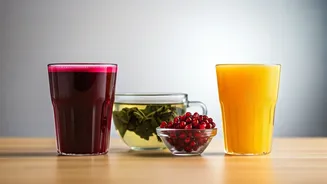Hydration's Crucial Role
Proper hydration forms the bedrock of healthy arteries and efficient blood flow. Staying adequately hydrated ensures the blood remains fluid, which helps
it navigate the arteries without obstruction. Dehydration can lead to thicker blood, increasing the risk of plaque buildup and impeding circulation. Water is the cornerstone of this process, acting as a solvent that enables efficient transport of nutrients and oxygen to vital organs, whilst assisting in the removal of waste products. Water intake also influences blood pressure, with sufficient hydration helping to maintain a healthy range. Therefore, making sure you are hydrated by drinking enough water each day is crucial for maintaining optimal cardiovascular health and overall wellbeing, creating an excellent starting point to address the topic of artery and blood flow.
The Power Of Green Tea
Green tea stands out as an exceptional beverage for vascular health due to its rich content of antioxidants, specifically catechins. These compounds have been studied extensively for their ability to combat oxidative stress and inflammation, both major contributors to plaque formation within the arteries. Studies suggest that regularly consuming green tea can reduce LDL cholesterol (often referred to as 'bad' cholesterol), a primary component of arterial plaque. The antioxidants in green tea also promote vasodilation, that is, the widening of blood vessels. This is beneficial in increasing blood flow. Furthermore, green tea's properties may help enhance the function of the endothelium, the inner lining of blood vessels, thereby improving overall vascular health. It's advisable to incorporate several cups of green tea daily to maximise these benefits, but it is important to be aware of any caffeine sensitivity.
Beets: Nature's Nitric Oxide
Beetroot juice is a natural powerhouse for cardiovascular wellness. This is mainly due to its high nitrate content, which is converted into nitric oxide in the body. Nitric oxide serves as a potent vasodilator, causing the blood vessels to relax and widen. The widening of the blood vessels enhances blood flow and helps lower blood pressure, both significant in preventing plaque accumulation. Research indicates that drinking beet juice regularly can improve exercise performance by increasing blood flow to muscles. It also demonstrates a reduction in blood pressure levels. Regular consumption of beet juice or incorporating beets into meals can be a delicious and powerful strategy for supporting arterial health. To achieve optimal benefits, consider drinking about a cup of beetroot juice or including beets in your diet several times per week to maximise the advantages. Please consult a health professional if there are any medical concerns.
The Benefits Of Pomegranate
Pomegranate juice is rich in antioxidants, particularly polyphenols, which are known to have a protective effect against cardiovascular diseases. Polyphenols have been shown to reduce the oxidation of LDL cholesterol, inhibiting the development of arterial plaque. Pomegranate consumption supports the health of the endothelium, the layer of cells that lines the blood vessels. A healthy endothelium promotes vasodilation and the reduction of inflammation. Pomegranate juice may contribute to lowering blood pressure, thanks to its vasodilating effects and its impact on endothelial function. Regularly drinking pomegranate juice can be a delicious and beneficial addition to your diet, working in tandem with other lifestyle adjustments to support healthy arteries and better circulation. Aim for a cup of pomegranate juice daily to get the best results, while being conscious of its relatively high sugar content.














![[WATCH] T20 World Cup 2026: Gautam Gambhir hosts dinner for Team India players ahead of Namibia clash](https://g-mob.glance-cdn.com/public/fc/image/7gXS1xdhs5Q0.webp)

